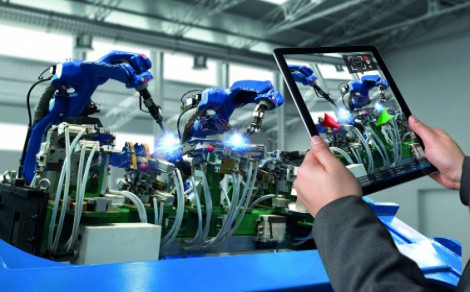Talking Industry: IIOT, digitalisation & Industrial Communications - smart steps to an AI future?

Digitalisation and the Industrial Internet of Things (IIoT) represents the next level of industrial automation. Consultant editor at DFA and chair Andy Pye summarises some of the discussions from the latest Talking Industry episode. There are many ways to catch up if you missed it: Talking Industry episodes are available on demand, and as Podcasts.
According to a poll conducted amongst the audience during the event, which asked, “do the green shoots emerging on the foliage outside the studio match those of IIoT in UK manufacturing?”,the answer is: yes and no. Only 10% judge themselves to be at an advanced level, while the remaining 90% were approximately equally divided amongst “Not sure where to start”, “At the start”, and “Midway on the journey”.
On the panel on this occasion were:
Jean-Paul Verheylewegen, Global Sales Manager, MB Connect Line (the IT security company acquired by Red Lion Controls in 2022)
Chris Barlow, Sales & Marketing Director, Novotek
Alejandra Matamoros, Technology Manager, Manufacturing Technology Centre
Luke Walsh, Managing Director, Brainboxes
Digitalisation is a journey, so to start with, keep it simple, start small, then scale up. We look at the how to get people and technology on the right road. Leading off, Jean-Paul highlighted the maxim of starting with small pilot projects, whilst having an holistic vision in mind of the overall benefits of digitalising the whole enterprise. Not so much “start small”, but “start smart” as he put it, a concept which all the panelists agreed.
Jean-Paul explained that there are two parts to an IIoT project: the first part is collecting data in the field from a variety of IoT devices, scale it, process it and then push it to a higher system, as an MES. The second part is generating value out of that data and distributing it. Two different sets of skills are required: people with an IT knowledge may have difficulties with data acquisition from the field, people with a more OT profile may have difficulties with cloud systems, value creation or distribution, because the tools that are used there require more specific IT competencies.
The theme continued with Chris, who focused on how to manage the data flow issues, all the way from acquisition to usage and thence to storage. Like Jean-Paul, he acknowledged the importance of getting people on board the journey, citing potential conflicts for budgets and even personnel themselves. He explained the differences by comparing a SCADA system, used for real-time visualisation and the control of a manufacturing system, with an MES, which is about bridging business systems and control systems, and managing people and processes and all of the data involved in transforming raw materials into finished goods.
Luke interjected that before you can choose between a holistic approach or a piecemeal approach to digitlisation, you need to convert the workforce from being (possibly) Digital Sceptics towards being Digital Champions - in his view, you cannot do this overnight, but in a slow measured approach.
-
PPMA 2025
23 September, 2025, 9:30 - 25 September, 2025, 16:00
NEC, Birmingham UK -
Advanced Engineering Show 2025
29 October, 2025, 9:00 - 30 October, 2025, 16:00
NEC, Birmingham UK










